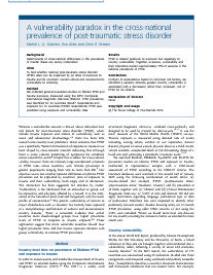A vulnerability paradox in the cross-national prevalence of post-traumatic stress disorder
Background
Determinants of cross-national differences in the prevalence of mental illness are poorly understood.
Aims
To test whether national post-traumatic stress disorder (PTSD) rates can be explained by (a) rates of exposure to trauma and (b) countries' overall cultural and socioeconomic vulnerability to adversity.
Method
We collected general population studies on lifetime PTSD and trauma exposure, measured using the WHO Composite International Diagnostic Interview (DSM-IV). PTSD prevalence was identified for 24 countries (86 687 respondents) and exposure for 16 countries (53 038 respondents). PTSD was predicted using exposure and vulnerability data.
Results
PTSD is related positively to exposure but negatively to country vulnerability. Together, exposure, vulnerability and their interaction explain approximately 75% of variance in the national prevalence of PTSD.
Conclusions
Contrary to expectations based on individual risk factors, we identified a paradox whereby greater country vulnerability is associated with a decreased, rather than increased, risk of PTSD for its citizens.
Geachte bezoeker,
De informatie die u nu opvraagt, kan door psychotraumanet niet aan u worden getoond. Dit kan verschillende redenen hebben,
waarvan (bescherming van het) auteursrecht de meeste voorkomende is. Wanneer het mogelijk is om u door te verwijzen naar de bron
van deze informatie, dan ziet u hier onder een link naar die plek.
Als er geen link staat, kunt u contact opnemen met de bibliotheek,
die u verder op weg kan helpen.
Met vriendelijke groet,
Het psychotraumanet-team.
In: The British Journal of Psychiatry, ISSN 0007-1250 | 209 | 1 | 1-6
http://doi.org/10.1192/bjp.bp.115.176628


